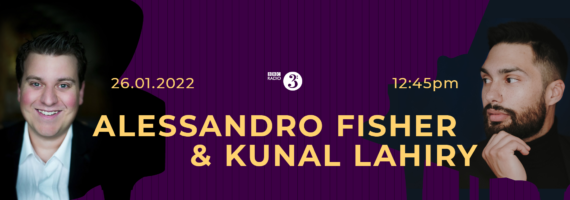Behind the scenes with…Alessandro Fisher

Ahead of his live debut at The Stoller Hall for BBC Radio 3 Manchester Week, we caught up with tenor Alessandro Fisher to learn more about his journey to becoming a professional musician on the world’s stage.
What can audiences expect from your performance at The Stoller Hall?
I hope this will be an interesting and fun journey through the seasons, as witnessed and then put to paper by poets and composers of lots of different nationalities. We all see nature and the seasons differently, with the inherent changes to light, temperature, flora and fauna meaning different things to different people. I wanted to explore how a poet and composer’s attitude to nature and the seasons is influenced by their lived experiences and the places they grew up in. I hope there will be some familiar sounds for the audience, maybe even some recurring themes that can be identified, but also some startling surprises along the way too!
What goes on behind the scenes when you’re getting ready for a performance?
People have often said that a performance is much like an iceberg, in that the vast majority of the work and preparation that goes into it remains largely unseen. This is especially true of a song recital, where a performer will explore a wide variety of different languages, compositional styles and indeed greatly contrasting themes. First and foremost, (and the part I find hardest!) there are the hours spent honing a programme that will (hopefully!) be entertaining and challenging, both for the artists and the audience. Once a programme has been chosen it’s then a question of slowly getting the music and lyrics “into the voice” or indeed “into the fingers” in the case of the pianist! This isn’t just a case of vocal repetition, although I’ll come to this in a moment, but also of organising coachings with language specialists and indeed genre specialists, who serve to bring a deeper layer of authenticity and understanding to a performance. Then comes the repetition… Hours and hours spent singing, speaking, even just thinking about the text, the music and their significance – all so that by the time it gets to the performance they have become ingrained in the body and the mind.
How did you build your career as a classical musician?
I was very lucky to be surrounded by music from a very young age. My mother was herself an opera singer, and has been teaching professional singers ever since I was born. I therefore grew up hearing opera and classical music as part of everyday life. There was never a part of me that thought that this might be an “unusual” career, as I had been exposed to it for so long that it felt totally normal! Just as valuable as the experience of hearing music from such a young age though, was witnessing everything that comes with a career in the performing arts – the good and, even more importantly when starting out, the bad. Being surrounded by musicians meant I heard all their stories of things that were going well and not so well, the highs and lows of auditioning, constant travel, the euphoria of the curtain call; the list could go on. It meant that when it came to starting out on my own career I felt that my eyes were open to the path I was choosing. Having been a choral scholar at university I went on to continue my studies by doing a Masters in Vocal Studies at the Guildhall School of Music. Meeting and working with people (both students and professors) who were so intensely passionate about classical music provided the perfect atmosphere to grow as a musician and a performer. It was at the GSMD that I became hugely passionate about song and the art of the song recital. The amazing coaches I was able to work and study with, as well as lots of wonderful pianists to collaborate with really fostered this passion and allowed me to explore a wonderfully wide variety of repertoire. I was then fortunate enough to sing in the choruses (and indeed go on to perform roles) at Garsington and Glyndebourne – both such incredible venues for fostering young talent and giving them opportunities to perform on world class stages at such important early stages of their careers. All of these experiences ultimately built on eachother, giving me the confidence to keep pursuing and building on my career.
What does it mean to have been a BBC New Generation Artist?
It has meant so much more than I can hope to express in a short paragraph! It has given me opportunities that I thought I could only dream of. I’ve performed in concert and recorded with four of the wonderful BBC Orchestras (with hopefully more to follow!); I’ve been able to come into the studios at Maida Vale to record song programmes with some truly amazing pianists; I’ve been able to perform recitals around the UK under the NGA banner, bringing my love of song to as many people as possible. In times of Covid, the NGA has been an invaluable lifeline, allowing me to keep working and keep recording, when I would otherwise have not been able to do so. The BBC, by inviting me into their NGA “family” have also shown me so much support and belief, both such important and often overlooked aspects of a performer’s life. I feel so immensely lucky to have been accepted onto the scheme.
Why is classical and chamber music important today?
In broader terms I feel that classical and chamber music have always been important to a modern audience. The themes that are dealt with, as well as the emotions and reactions they elicit from an audience are just as relevant today as they were when they were first composed. Moreover, the pandemic has helped show the world just how important a healthy and productive music industry is. When we were confined to our houses we often turned to music for comfort, inspiration, and, of course, escapism. This will continue to be the case even after the world fully reopens, and indeed I think we will all feel an even deeper appreciation of the joy that only classical music can bring!
Favourite musician and why?
This is a particularly difficult question, as there are so many aspects of performance that can lead to someone being considered a “favourite”. In terms of the sheer joy and enjoyment that I feel though when listening to a piece of music, I think the prize has to go to the German tenor Fritz Wunderlich. Whenever I listen to a recording to his I can’t fail to smile, forget everything else and just sit back and relax – what more can someone ask of a performer?!
You can book tickets here for Alessandro Fisher and Kunal Lahiry on Wednesday 26 January

